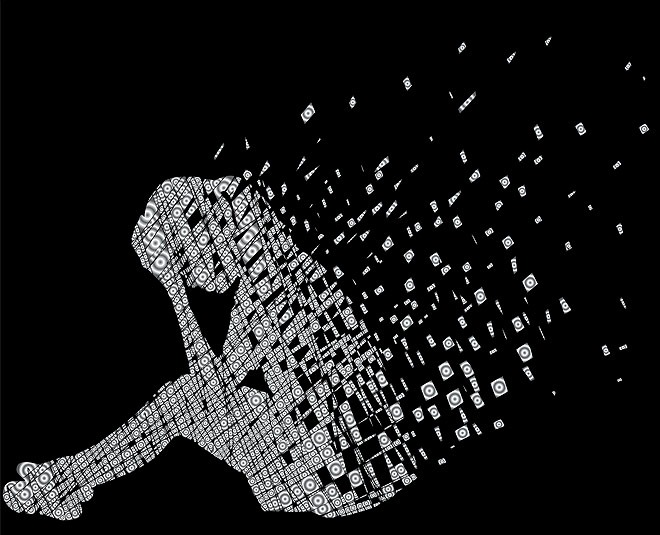Qaiser Dar
Srinagar 09 October (KNB): The people of the valley were already experiencing isolation even before the Covid-19 lockdowns, talk about deteriorating mental health or drug abuse in Kashmir these months, there has been huge increase in the cases, Dr. Maqbool (HOD) Mental Health Neuroscience said.
“Kashmir was already in a state of lockdown prior to the restrictions that were imposed due the Covid-19 situation. During the first lockdown (abrogation of article 370) phase, the number of patients visiting our institution because of mental health problems as well as substance abuse, certainly increased but then during the Covid-19 lockdown, there has been an alarming rise in the cases,” he said.
He added that depression, stress disorders, anxiety and panic disorders were only a few problems among many, during the lockdown (after abrogation of article 370 and Covid-19) period.
As per the reports from the Government Psychiatric Disease Hospital, from April to August 2020, 158 (males) 40 (females) were admitted for the treatment of general psychiatric problems. In the same period, 141 patients were admitted for drug de-addiction treatment.
As per the OST data of September 2020 alone, 245 {F11 (Heroine IV users)}, 53 {F19 (users of multiple drugs)}, 36 {F12 (Cannabis users)}, totaling to a number of 334 cases, were registered.
Dr. Maqbool said that being forced to stay indoors, month after month, obviously compromises the mental health of a human being. In fact, during the lockdown (abrogation of article 370), Internet as well as other cellular services in the valley was completely blocked, which would add to anyone’s frustration in the 21st century.
“During the Covid-19 lockdown, we came across a different psychiatric problem in our patients that is cell phone/internet addiction. Since no one could roam around, they started spending excessive time online, especially on their cell phones, now making it hard for them to spend a moment without it. Many people still call me and talk to me about how much difficult it is for them to leave their phones aside,” he added.
While talking to KNB, Dr. Maqbool said, “After the Covid-19 restrictions were imposed, we came across other mental problems which were not really there before, like Obsessive Compulsive Disorder (OCD).
In an attempt to explain it (OCD), he said, “during the pandemic, people started to wash their hands more times than actually needed. They would use sanitizers in an excessive manner, all this was resulting in a change of behavior which was having a negative impact on their family, other people around as well as themselves”.
According to the study by Dr. Yasir Rather (Associate Prof. Department of Psychiatry, GMC), in two districts, Anantnag and Srinagar, 2% of the population from the age group of 10 years to 75 years are actively dependent on substances. These 2% estimates to 18000 people.
“It is more concerning that among these 18000 people, 90% are using hardcore drugs like heroin and brown sugar. And out of those 45% are the abusers using IVS {Intravenous Sedation (injections)}, which is a very dangerous trend. Most of the complications happen due to IVS, infections/diseases like habitats C, B, HIV are few of them. Sharing or re-using of these injections result in such complications. Almost 40% of the abusers told us, about the experience of overdoses resulting in minor heart attacks, which in future increases the chances of major heart attacks resulting in death,” Dr. Rather said.
Dr. Yasir while talking to KNB said, “Covid-19 related restrictions like staying at home all the time, maintain social distance, instigated the feeling of loneliness among people. More importantly, economic burden has increasing day in and out for months now, resulting in disruption of the mental state of the people”.
The fear of covid19 as well as the infodemic surge caused distress among the people. The condition of those, who were having psychiatric problems even before the lockdowns, got worst. Many among these patients couldn’t visit the government facilities (psychiatric specialists) and were not able to follow up with the treatment. The patients who had almost recovered got pulled back into the mental darkness.
Dr. Yasir told KNB that there were many patients who had freshly started substance abuse because of financial problems, laps in businesses due the covid-19 lockdown. “Many among them were entrepreneurs, who couldn’t coupe up with the failure of their newly established businesses due to the lockdowns, turned to the use of drugs. It is quite unfortunate that these substances are easily available in Kashmir,” he said.
Young people, who turned towards substance abuse, in last 6 months, have given reasons like they were bored at home because of back-to-back lockdowns.
Associate Prof. said, “Substance abuse has been a major factor behind the surge in psychiatric issues. The lockdown had quite an impact over the drug trafficking gangs, resulting in non-availability of these substances causing withdrawal symptoms, which in many cases became the reason to seek treatment”.
“Unfortunately, in our valley we don’t have much of the recreational activities, adding more to the frustration of these innocent souls apart from the lockdowns and conflict itself,” Prof added.
Dr. Maqbool mentioned that it is the Mental Illness Awareness Week, through different programs we train the teachers to deal with students facing mental issues. They learn the skills to council students who have become a victim of drug abuse or, are having any other mental issues.
“Since we are facing a pandemic, we spread awareness through webinars/virtual mediums. We are doing such programs on regular basis as well,” he added.
“Anywhere around the World, in a state of conflict, the rise of psychiatric problems is imminent. The people of Kashmir are no different and the impact of the conflict related issues are quite obvious,” Dr. Maqbool said. (KNB)

